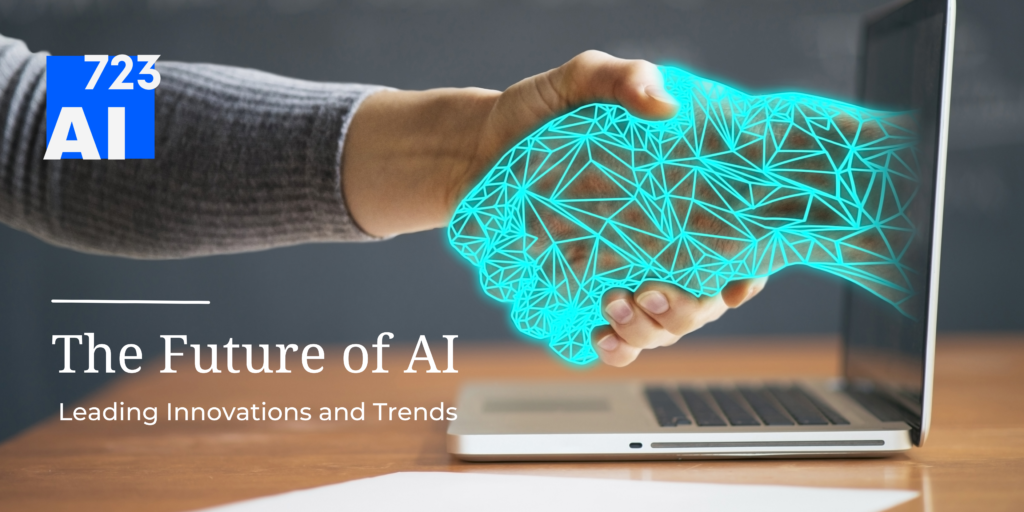
The Future of AI: Leading Innovations and Trends
Artificial Intelligence (AI) is no longer a futuristic concept confined to the realms of science fiction. Today, AI is a transformative technology that is reshaping industries, driving innovation, and altering the way we live and work. As we look ahead, the future of AI promises even more exciting developments and trends. In this blog, we will explore some of the leading innovations and trends in AI that are set to revolutionize our world.
1. AI in Healthcare
One of the most promising areas for AI is healthcare. AI has the potential to revolutionize medical diagnostics, treatment plans, and patient care. Here are some key innovations:
- Predictive Analytics: AI algorithms can analyze vast amounts of data to predict disease outbreaks, patient deterioration, and treatment outcomes. This helps in early intervention and personalized treatment plans.
- Medical Imaging: AI-powered tools can analyze medical images such as X-rays, MRIs, and CT scans with high accuracy, assisting doctors in diagnosing conditions like cancer, heart disease, and neurological disorders.
- Robotic Surgery: AI-driven robots are being used in surgical procedures to enhance precision, reduce recovery times, and minimize complications. These robots can perform complex surgeries with greater accuracy than human surgeons.
2. AI in Education
AI is also making significant strides in education, transforming the way students learn and educators teach:
- Personalized Learning: AI can create customized learning experiences tailored to the needs and abilities of individual students. This ensures that each student can learn at their own pace and style.
- Smart Content: AI can develop interactive and engaging educational content, including digital textbooks, virtual tutors, and interactive exercises, making learning more enjoyable and effective.
- Automated Grading: AI systems can grade assignments and exams quickly and accurately, allowing teachers to focus more on instruction and less on administrative tasks.
3. AI in Finance
The finance industry is leveraging AI to improve services, enhance security, and streamline operations:
- Fraud Detection: AI algorithms can detect fraudulent transactions by analyzing patterns and anomalies in real-time. This helps in preventing financial crimes and protecting customers’ assets.
- Algorithmic Trading: AI-powered trading systems can analyze market data and execute trades at high speeds, maximizing profits and minimizing risks for investors.
- Customer Service: AI chatbots and virtual assistants are providing 24/7 customer support, answering queries, and resolving issues quickly and efficiently.
4. AI in Transportation
AI is driving the future of transportation, making it safer, more efficient, and more accessible:
- Autonomous Vehicles: Self-driving cars and trucks, powered by AI, are being developed to reduce accidents, improve traffic flow, and provide mobility solutions for those unable to drive.
- Traffic Management: AI systems can analyze traffic data to optimize traffic signals, reduce congestion, and improve overall traffic flow in urban areas.
- Predictive Maintenance: AI can predict when vehicles and infrastructure need maintenance, preventing breakdowns and prolonging the lifespan of transportation systems.
5. AI in Retail
Retailers are using AI to enhance customer experiences, optimize operations, and drive sales:
- Personalized Recommendations: AI algorithms analyze customer behavior to provide personalized product recommendations, increasing customer satisfaction and sales.
- Inventory Management: AI can forecast demand, manage stock levels, and reduce waste, ensuring that the right products are available at the right time.
- Customer Insights: AI tools analyze customer feedback and purchasing patterns to provide insights that help retailers improve their products and services.
6. Ethical AI
As AI continues to advance, ethical considerations are becoming increasingly important:
- Bias and Fairness: Efforts are being made to ensure that AI systems are free from bias and treat all individuals fairly. This involves developing algorithms that are transparent, accountable, and inclusive.
- Privacy: Protecting user data and ensuring privacy is a major concern. AI systems must be designed to handle data responsibly and comply with regulations.
- Job Displacement: While AI can create new jobs, it can also displace existing ones. Preparing the workforce for this transition through reskilling and education is crucial.
7. AI and Climate Change
AI has the potential to play a significant role in addressing climate change and promoting sustainability:
- Energy Management: AI can optimize energy usage in buildings, reducing consumption and lowering carbon footprints.
- Climate Modeling: AI can analyze climate data to predict future climate patterns and inform policy decisions.
- Sustainable Agriculture: AI can optimize farming practices, reducing waste, and increasing crop yields, contributing to food security and sustainability.
8. AI in Creative Industries
AI is also making its mark in creative fields, enhancing artistic expression and innovation:
- Music and Art Creation: AI algorithms can compose music, create visual art, and even write poetry, collaborating with human artists to push the boundaries of creativity.
- Content Generation: AI tools can generate content for films, video games, and literature, assisting creators in developing new and engaging stories.
- Design and Fashion: AI can analyze trends and generate new designs in fashion, interior design, and architecture, inspiring new styles and innovations.
Conclusion
The future of AI is incredibly bright, with innovations and trends that promise to transform various sectors and improve our daily lives. From healthcare and education to finance and transportation, AI is driving progress and opening up new possibilities. However, it is essential to address ethical considerations and ensure that AI development is guided by principles of fairness, transparency, and responsibility. As we continue to explore the potential of AI, we can look forward to a future where technology enhances our capabilities and helps us solve some of the world’s most pressing challenges.
